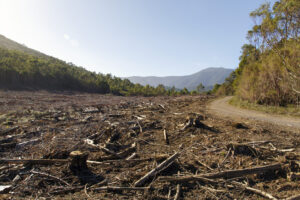Share
Last month’s New South Wales election ejected the final mainland Coalition state government from office.
As the dust has settled, it isn’t just Chris Minns’ Labor Party which has emerged victorious; public ownership – particularly of Sydney Water – has been resoundingly endorsed by NSW voters. It is now safe to say: privatisation is politically dead in Australia.
Good policy, good politics
As opposition leader, Chris Minns was not known for picking policy fights. He was criticised by some for running a ‘small-target’ platform, focussed largely on specific or niche issues like mobile phones in schools, hidden speeding cameras, and toll roads.
But Minns nevertheless drew a clear line between Labor and the government on privatisation. Minns ruled out any further privatisations of state-owned assets, and linked the Coalition government’s previous modus operandi of ‘asset recycling’ (privatising public assets to fund future infrastructure investments) with higher state debt, worse services, and rising bills.
This was a strong policy position – and it turned out to be good politics, too. It helped differentiate Minns’ Labor Party from both the Coalition government and, importantly, from the last NSW Labor government, which under former Premiers Iemma and Keneally defied public will to pursue electricity privatisation. (The sell-off of the state’s electricity system was then completed by the Coalition.) When reports emerged that the Perrottet government was considering (or at least not ruling out) the privatisation of Sydney Water, Minns and Labor launched a sustained and ultimately successful attack on the government.
Public ownership is popular – and it’s no mystery as to why. Publicly owned enterprises provide consistently cheaper and more reliable services because they are run for public good, not private profit. On the other hand, the owners of privatised services have strong incentives to cut corners and raise prices in pursuit of higher profit margins. This consistently leads to privatised services being more expensive and less reliable.
In the specific case of water privatisation, there is overwhelming evidence that private water leads to more debt, less investment in water infrastructure, loss of reliability and quality – and higher bills. Research from the Centre for Future Work shows that if the experience of the UK and US were replicated in NSW, water bills could increase by 39% (based on the UK experience) to 59% (the US record), imposing extra costs on an average Sydney customer of $174 to $264 per year. Amidst a cost-of-living crisis, NSW voters were rightly sceptical of privatising this essential service.
Australian Labor turns against privatisation
The NSW Labor victory is the latest in a trend of state Labor parties winning big on anti-privatisation platforms.
At last November’s Victorian election, Victorian Labor pledged to recreate the State Electricity Commission (SEC).This promise was widely cited as the ‘cut-through’ issue which led to that party’s dominant victory. Dan Andrews publicly regretted the ALP’s 1990s privatisation of Victorian energy as ‘a mistake’ and ‘wrong’, and called for electricity to be run for people, not for profit. The Premier’s campaign rhetoric was scathing: ‘Privatisation has failed. It’s failed pensioners, it’s failed families, it’s failed Victorians.’
Earlier last year, South Australian Labor also returned to government, after only one term in opposition, pledging to return the recently privatised state railway network to public ownership. They have already followed through on this pledge, announcing on April 2 a deal to scrap the private contract with no early termination fees. Newly elected Premier Peter Malinauskas has also openly canvassed bringing electricity generation back into public hands.
Meanwhile, the Queensland Labor government, led by Premier Annastasia Palaszczuk government has also affirmed its opposition to privatisation and supported public ownership. In the 2017 election it promised to create ‘CleanCo’, a $250 million-funded publicly-owned renewable energy generation corporation; this new firm began operating in 2019.
The newfound commitment by state (and federal) Labor parties to publicly owned electricity constitutes a substantial shift in the politics of privatisation in Australia. Indeed, it was not long ago that Australian Labor often pursued privatisations at state and federal levels.
State Labor governments entertained and enacted privatisations throughout the 1990s, 2000s, and even into the 2010s – only slightly less zealously than their Liberal counterparts. And at the Commonwealth level, Paul Keating, as Treasurer and later Prime Minister, famously oversaw the privatisations of Commonwealth Bank and Qantas.
After Chris Minns’ victory, supporters of privatisation have been defeated. Privatisation was never particularly popular, but now even association with the possibility of further privatisations spells defeat for any party.
Return of the state?
But while the politics of privatisation have certainly shifted, substantive change in politics and governance still lag behind.
Despite campaigning on ‘bringing back the SEC’, Victorian Labor’s plan is not to return the state to its pre-privatisation model of government-owned electricity generation, transmission, and delivery. Instead, the new SEC will be limited to building new publicly-owned renewable energy generation, and possibly offering an alternative public energy retailer in an otherwise private market. This is progress, to be sure, but Victoria’s energy system will largely remain privately-run and for-profit.
On housing, the widely-criticised Housing Future Fund reflects the Albanese government’s unwillingness to support substantial state intervention into the Australian housing market. How could we expect the stock market to pay for public housing? Likewise, the prevalent outsourcing of public services and governance to consultancy firms plagues both state and federal Labor governments. Privatisation may be politically dead, but misguided perceptions of private sector efficiency and economic rationalism continue.
In a cost of living and housing crisis, Australians voters have rightly decided that privatisation is a rort, and that governments have the power – and responsibility – to deliver high quality public services.
State and federal governments, Labor or otherwise, would be wise to listen.
Between the Lines Newsletter
The biggest stories and the best analysis from the team at the Australia Institute, delivered to your inbox every fortnight.
You might also like
Five priorities for the next parliament if we want a liveable Australia
Climate and nature crises won’t pause while politics plays out.
The election exposed weaknesses in Australian democracy – but the next parliament can fix them
Australia has some very strong democratic institutions – like an independent electoral commission, Saturday voting, full preferential voting and compulsory voting. These ensure that elections are free from corruption; that electorate boundaries are not based on partisan bias; and that most Australians turn out to vote. They are evidence of Australia’s proud history as an


